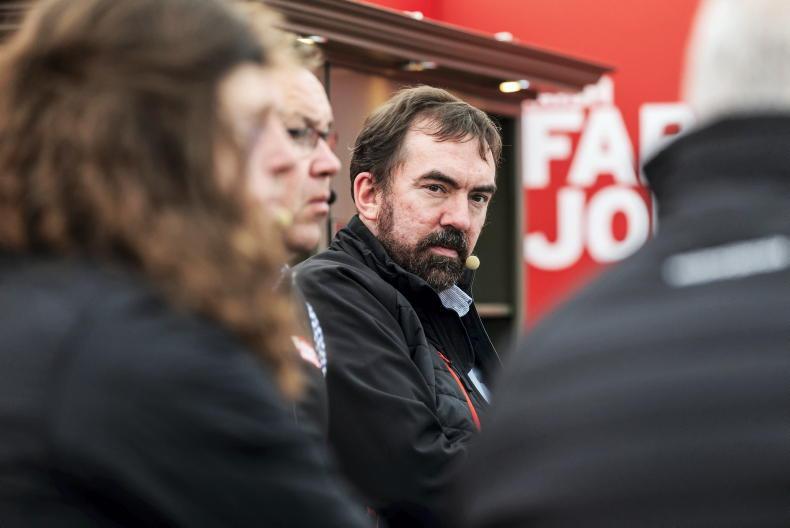While farm incomes have been hugely volatile over recent years, costs seem to only be moving higher. This means that the old measure of what is a good price, whether it be for milk, livestock or crops, has had to also move higher.
In 2023 farm incomes were half of their 2022 amount, and fell to the lowest level since 2013.
Down to Business with
Lorcan and Phelim: Tuesday at 12pm, Thursday at 11:30am.
Lorcan Roche Kelly and Phelim O’Neill will take a look at the trends on the cost side, to see where relief might be coming, and will also look at the international picture for agri-food exports and explain why there is still a world of opportunities out there for the high-quality food produced on this island.
Business breakfast, 8am, Wednesday
Lorcan and Phelim will be joined by Professor Michael Wallace and Emma Dillion, economist and senior research officer with the Teagasc National Farm Survey, to discuss the challenges facing the agricultural industry in Ireland.
There will be a particular focus on the results of the recent KPMG report, commissioned by the Irish Farmers Journal, looking at the implications for the industry from a further cut to the nitrates derogation.
The report found that the impact of the changes across Irish farms could be a loss of up to €1.4bn with a further potential €1.6bn loss beyond the farm gate in the processing sector.
In addition to these financial losses, it found that job losses across the value chain could range from €22,000 to €29,000.
The core reason for a potential €3bn impact is a projected loss of production, which could be as high as 15% in the beef sector, 12% in dairy and 4% across all other livestock categories.

Agribusiness editor Lorcan Roche Kelly will host a series of panel debates. \ Philip Doyle
Exposed
It also estimates a 4% fall in tillage, the lowest-emitting sector of Irish agriculture. Dairy farming is particularly exposed if it has tocomply with a maximum 170kg N/ha limit and the report estimates that up to 55% of dairy farms, which is 9,500 farms, will be negatively impacted with an 8% loss of production.
Specialised beef finishing farms will also be impacted
and while these may number less than 200, they account for a quarter of all cattle entering the meat factories.
On the CAP, which came into effect last year, the report finds a significant redistribution of payments in favour of Connacht and Ulster, where there was a 7% increase, but payments in Leinster are down 6% and Munster is down 3% in 2023 compared with the previous CAP payments in 2022.
While farm incomes have been hugely volatile over recent years, costs seem to only be moving higher. This means that the old measure of what is a good price, whether it be for milk, livestock or crops, has had to also move higher.
In 2023 farm incomes were half of their 2022 amount, and fell to the lowest level since 2013.
Down to Business with
Lorcan and Phelim: Tuesday at 12pm, Thursday at 11:30am.
Lorcan Roche Kelly and Phelim O’Neill will take a look at the trends on the cost side, to see where relief might be coming, and will also look at the international picture for agri-food exports and explain why there is still a world of opportunities out there for the high-quality food produced on this island.
Business breakfast, 8am, Wednesday
Lorcan and Phelim will be joined by Professor Michael Wallace and Emma Dillion, economist and senior research officer with the Teagasc National Farm Survey, to discuss the challenges facing the agricultural industry in Ireland.
There will be a particular focus on the results of the recent KPMG report, commissioned by the Irish Farmers Journal, looking at the implications for the industry from a further cut to the nitrates derogation.
The report found that the impact of the changes across Irish farms could be a loss of up to €1.4bn with a further potential €1.6bn loss beyond the farm gate in the processing sector.
In addition to these financial losses, it found that job losses across the value chain could range from €22,000 to €29,000.
The core reason for a potential €3bn impact is a projected loss of production, which could be as high as 15% in the beef sector, 12% in dairy and 4% across all other livestock categories.

Agribusiness editor Lorcan Roche Kelly will host a series of panel debates. \ Philip Doyle
Exposed
It also estimates a 4% fall in tillage, the lowest-emitting sector of Irish agriculture. Dairy farming is particularly exposed if it has tocomply with a maximum 170kg N/ha limit and the report estimates that up to 55% of dairy farms, which is 9,500 farms, will be negatively impacted with an 8% loss of production.
Specialised beef finishing farms will also be impacted
and while these may number less than 200, they account for a quarter of all cattle entering the meat factories.
On the CAP, which came into effect last year, the report finds a significant redistribution of payments in favour of Connacht and Ulster, where there was a 7% increase, but payments in Leinster are down 6% and Munster is down 3% in 2023 compared with the previous CAP payments in 2022.







 This is a subscriber-only article
This is a subscriber-only article










SHARING OPTIONS: